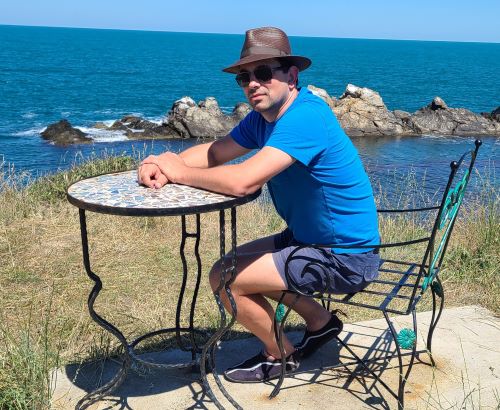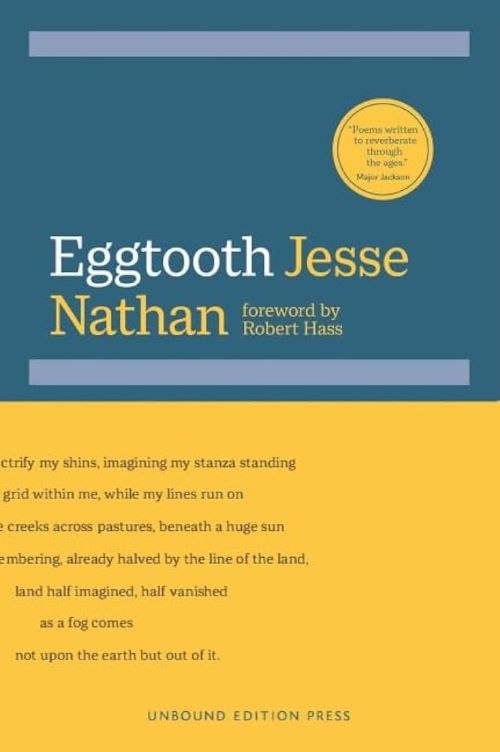Woke to a wind that rose full of birdcalldropping it fresh as if drawn from a well.Starlings mobbing elms like a creek talking.Farmhouse window rattling lightly. My eyesfind my desk: notes and lists, tasks and numbersinterbedded with books stacked — like the beamsthat used to be a soaphouse, now mythicbehind the barn — in dust, cord, silverfishgrowing over clear intention. Love, Iwoke to the wind that rose up full of birdsand for a second didn’t know my name.Woke with a tickle of panic, hauntedbut not sure why. A thirsting to havemy sensibility immersed, drawn throughan othering element, though I thinkhe’s a wretch. My job today is to digto put in a few posts, put in a fence,and as I stab and sink my narrow spadethrough turf and root and worm and sticky clay,I’m thinking of boundaries, I’m thinking himhooligan, scamp, soldier. Skilled at singing. He traded cow for lyre. Joined an armyto feel sober, fatal. And in buskinsfought among medlars, where the wine waves lispAegean sand lining the isle Thasos,where marble quarries ziggurat down.Lived by the ash-spear, liked screwing like war.Seam of the scrotum, he sang. Wick rubbed raw.Iamb a weapon. Myrtle, soft horn, grape.One fragment reads simply, rhinoceros.When his promised’s father called it off,he seduced her young sister in a poemand came on her crotch in the last tercet.Kept living by the promptings of his sex.Said need is a limb-loosener. And thenof his poems crowed, There’s virtue in the feet!His were silenced by an acquaintance, Crow.It was an all-out fight, we don’t know whyCrow slashed him groin to throat, left him to rats. His mom had been enslaved. His highborn dada founding father of a frontier town,island spired with pines and arching from the sealike an ass’s backbone. He thought friends hurtthe most. That we were surely promised light.That change is birth: metamorph, term of artfor stone’s reception to — without melting —great stress. In the fall heat, I plant these poststill lunchtime. Sandwich of apple, turkeysliced sheer as cheesecloth, on buttered wholegrain.I hear George, my cabbie once in Athens:Sure it’s nice here, unless you want to leave. Hypocrite. Greek for actor, answerer,interpreter. When you read these drafts, love,you frown. Say so much anger in your lines.Anger? Is that it? With marble tongues and teethhe’d adorned his escutcheon of wood,it nictated in sunlight like sunlit seas —I’m thinking of our work and what it means:A fence may be a seam, or seem a bridge,both are gestures in the air. This, a shieldso the dogs don’t muck in the septic soup,to separate what’s slough from what runs free —that’s what I think I’m up to here? Maybe. (Initiatory lust, remember whenyou brought me here, nudged me down on bracken,toiled on me like on a straw, gnats fussing …A pleasure went out through me like a galethough pleasure is much too shallow a wordfor what roils me like ribbons in a wind.Some law, some ageless vise, had grip of meand squeezed and squeezed, and wrang me fully out.) It’s so far back in time. The critics say“we have no reason to believe he inany sense ever reached home.” Deservedwasps hover on his gravesite. “The scold,” whatPindar called him. Horsetail-helmed, liver-tonguedand ever hard as stakes of Osage Orange.Who hated the polish of frauds and hacks,hated tasteless desire, boring dinners.Overlook my ways, he’d say. I’m countrified.Eat with my hands. Read naked in the stock tank.Banned in Sparta for his candor. In Romeall trainee-priests were forbidden his poems. But to the Spartans, his lascivitywasn’t the obscenity. What burned them upis just what carries me through unmoored months,has carried me, and has to sound my poemfor one who had no epic in him, hadjust one shot voice, a tetchy melody:Who, as he tells it, bleeding on Thasosin the screech of battle, perceives he loveshis life more than that fight, more than dutyto any reckless collectivity,shrugs off his prized and perfectly good shieldbecause he can run faster without it,and abandons those slopes, to start over.
Archilochus
Feature Date
- October 22, 2023
Series
Selected By
Share This Poem
Print This Poem
“Archilochus” from EGGTOOTH: by Jesse Nathan.
Published by Unbound Edition Press on September 5, 2023.
Copyright © 2023 by Jesse Nathan.
All rights reserved.
Reproduced by Poetry Daily with permission.

Jesse Nathan was raised in rural Kansas and northern California. His poems appear in the Paris Review, the New York Review of Books, the Believer, the Nation, and elsewhere. Eggtooth, which was just published by Unbound Edition Press and with a foreword by Robert Hass, is his first book. Nathan lives in Oakland.
“Jesse Nathan’s Eggtooth is an ambitious, brilliant rethinking of what making a poem is. Again and again the author makes us feel that we have been present at the creation.”
—Frank Bidart
“I can’t think of another writer who so clearly sees the land for what it is: the actual organ from which we emerge and whose fate is directly linked to our own …”
—Marie Mutsuki Mockett
“Brilliant and unexpected … This is gorgeous writing … It registers at the level of sound the way everything is like and not like everything else; it creates an ecosystem of echoic effects … A book about growing up … about, made out of, an intense, sensual sense of place.”
—Robert Hass, from the foreword
Poetry Daily Depends on You
With your support, we make reading the best contemporary poetry a treasured daily experience. Consider a contribution today.




